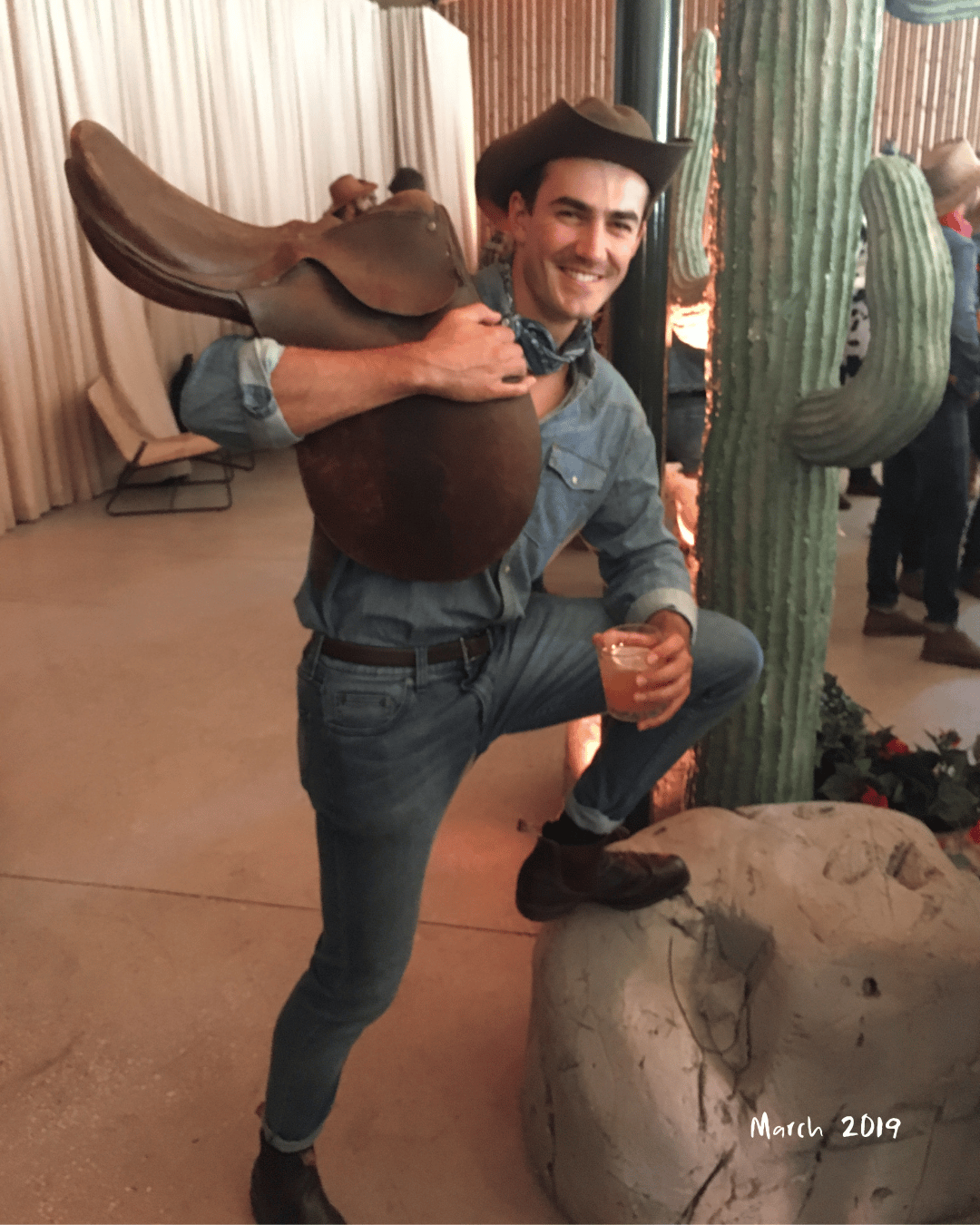- Reuben's Blog
- Posts
- The System Failed Us.
The System Failed Us.
But only if we do nothing does it take our power.
In March 2019, I was sexually assaulted after a staff party at Cricket Australia. I told friends within hours, reported it to the police three days later, and then waited for the wheels of justice to start turning. Four years later, my case reached the Magistrate’s Court and resulted in a guilty verdict. That decision was immediately appealed, leading to a retrial in the County Court where, after 18 more months, I once again gave my evidence.
Three days ago on Friday, I sat in the courtroom with my blood boiling as Judge Lauritsen dismissed the charge, claiming it couldn’t be proved beyond reasonable doubt. The interpretation of evidence was bullshit to put it lightly. Apparently having a photographic memory and your wits about you is not possible if you’ve been drinking all night (does that make me unbelievably high-functioning?). If life wasn’t hard enough for victims, it’s sad that some upholding the law don’t think to consider how trauma impacts a human’s behaviour.
So after a six-year-long journey through a system that ultimately chose the possibility of the perpetrator’s truth, based on his candid body language during denial, I was left fuming.
I won’t sugarcoat it: in that moment, I was ready to punch a wall. When we left the court room, I went into a private room with my brother, gave him a hug and wept on his shoulder.
For the rest of the day, I felt empty, trying to process not just my pain but also the injustice of a system that seems designed to silence survivors. “Is this really the world we live in?” I thought as faith in humanity sank to a new low.
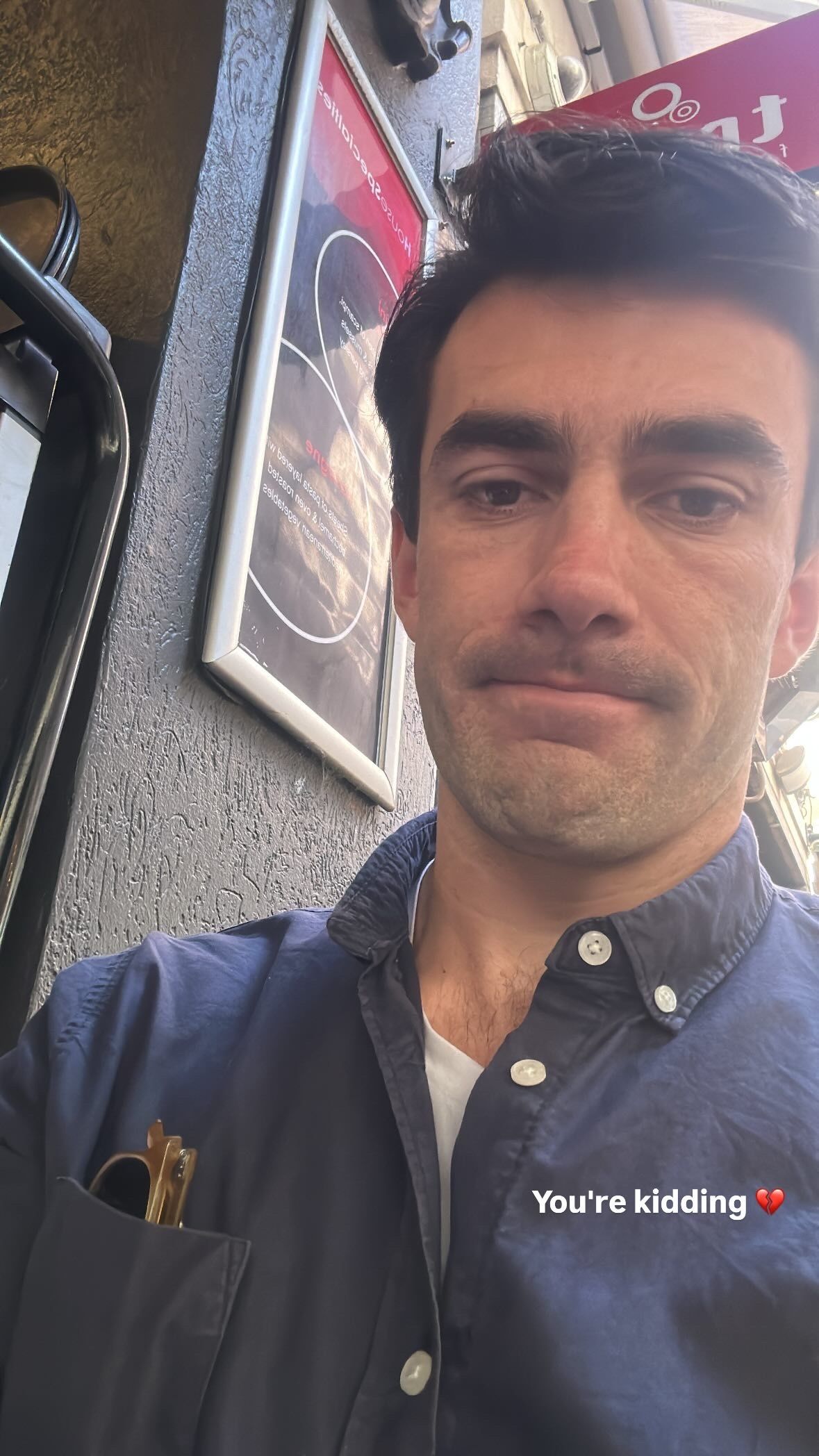
This experience has opened my eyes to how fundamentally broken the legal system is, and how much work lies ahead. Sadly, the ending of my case reinforced messages of despair.
The message from the system to predators is: if you can afford a top lawyer who knows how to delay justice until your version of events is ‘possible’, you can escape a criminal record and be reimbursed for the whole thing.
The message from the system to victims is: if it comes down to your word versus theirs, justice is nearly impossible to achieve.
I honestly don’t know what more could have been done. Which got me thinking… if an educated, white, male who reported immediately, with the whole-hearted support of Cricket Australia can’t get a conviction…
What hope does this give to people who repress their trauma for years before coming forward?
What hope does this give to less-privileged people without support?
Despite that crushing moment, being there to face it in person was important for my healing.
In the beginning I had no idea what this trauma could do to me and I didn’t want to find out. The story of a woman who bottled it up for 15 years until she committed suicide entered my head, and that was enough for me to tell Mark and Michael within hours of it happening.
Healing from the trauma was like trying to patch up a flesh wound. At first it was intimidating, like there was blood everywhere, covering up how bad the gash was. But over time, the blood was cleaned up, I could see the wound, stitch it up, and let it fade into a scar. It’s a scar that’ll always live with me, but it doesn’t stop me from living my life.
Along side therapy, talking about it reduced the weight of the trauma. The first time I went public, it turned it into something I was no longer scared to address. Another significant moment was the opportunity to MC the Deakin University Chancellor’s Dinner - the first time I introduced myself to a heavy-hitting crowd as a survivor. Every opportunity to speak up was a test of ‘are you going to let this thing control your life? Or are you going to control it?’ It began with carefully considered written posts, and relaxed into memes on my trampoline. Who knew a comment like “I believe you, Reuben” from someone called SuperSonicMoose on TikTok could be so empowering. Speaking up showed me how much support is out there, and over time it felt like the force of an army was building behind me.
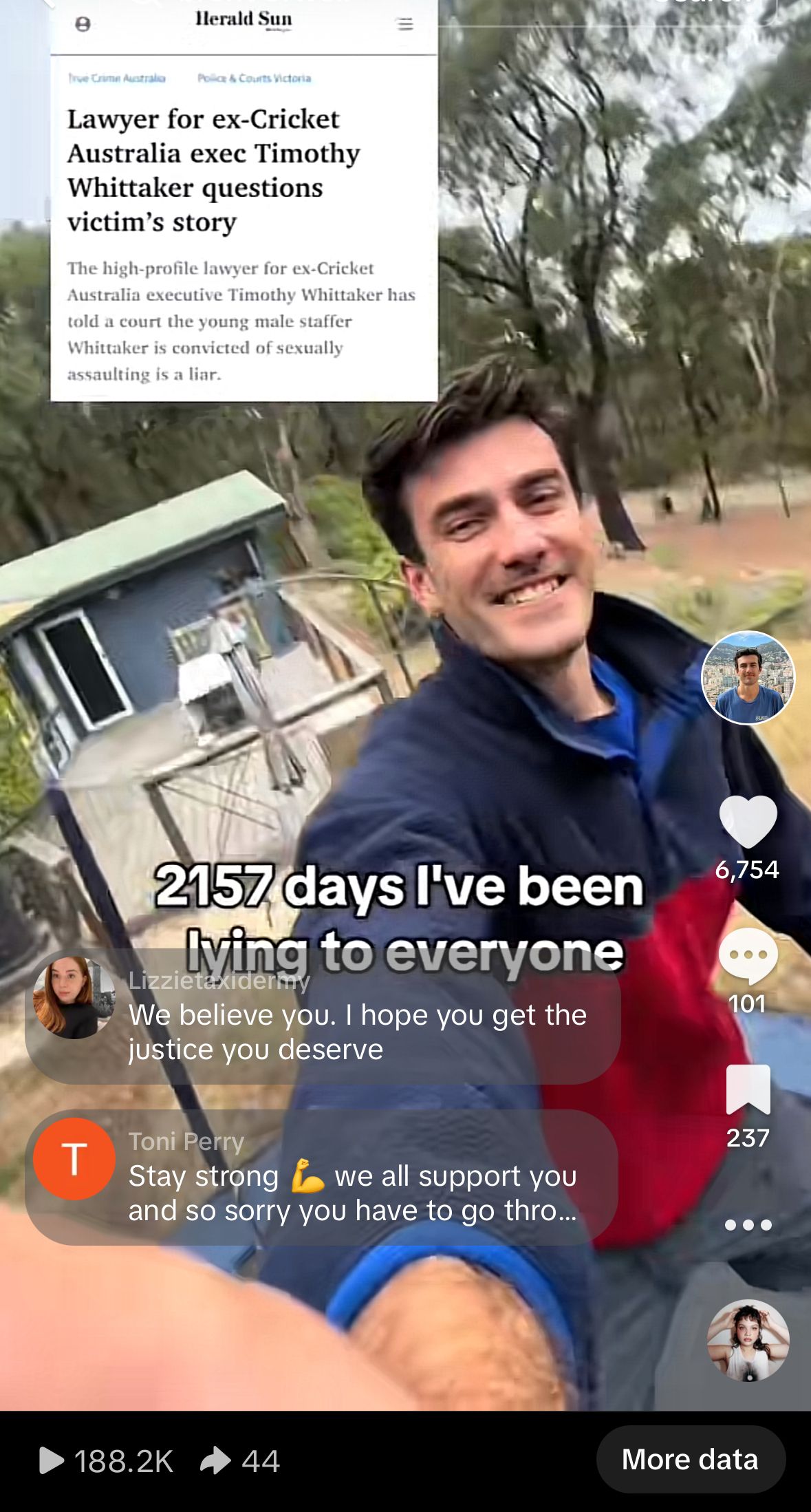
But if I wasn’t initially blind to the rigours of the legal system, I’m not sure I would have ever got started. For me the decision to report was like reporting someone for stealing my car - of course I would. But as the delays and appeals unfolded I came to learn what I actually signed up for. The more I talked with survivors, the more I learned about the barriers in their minds. I was completely naive to the different barriers that men, women, people of colour, and minority groups face.
My decision to make a statement to police came in a cafe in the CBD with my friend Emily. I could see that she didn’t want to push someone already hurting into anything uncomfortable, but I could also see she really wanted me to do what was right. In the end I thought ‘If I don’t do anything and later find out that someone else has been impacted by this guy, I’ll feel even worse than I do now.’ And so I made my statement.
But as I began to understand what seeking justice involved, and as more survivors began to ask me “what should I do after being assaulted?” I found myself in Emily’s shoes, delivering the cautious line of “Do whatever is best for you.”
But to be completely honest, I fucking hated every time I said it. Because what it really means is, even though you deserve justice:
Consider how drawn out the legal system is
Consider how uncomfortable a defence lawyer might make you feel
Consider how uncomfortable you’re going to make other people feel who have to pick sides
Consider how uncomfortable you’re going to feel when people don’t believe you or put the blame on you
Consider how re-traumatising the process will be for many years to get a tiny chance at justice
These realities should not be the price for reporting a horrific crime, and predators shouldn’t feel safe knowing that the system will protect them. It’s understandable that many choose not to report these crimes, but every time silence prevails, we inadvertently reinforce a system that continues to fail survivors.
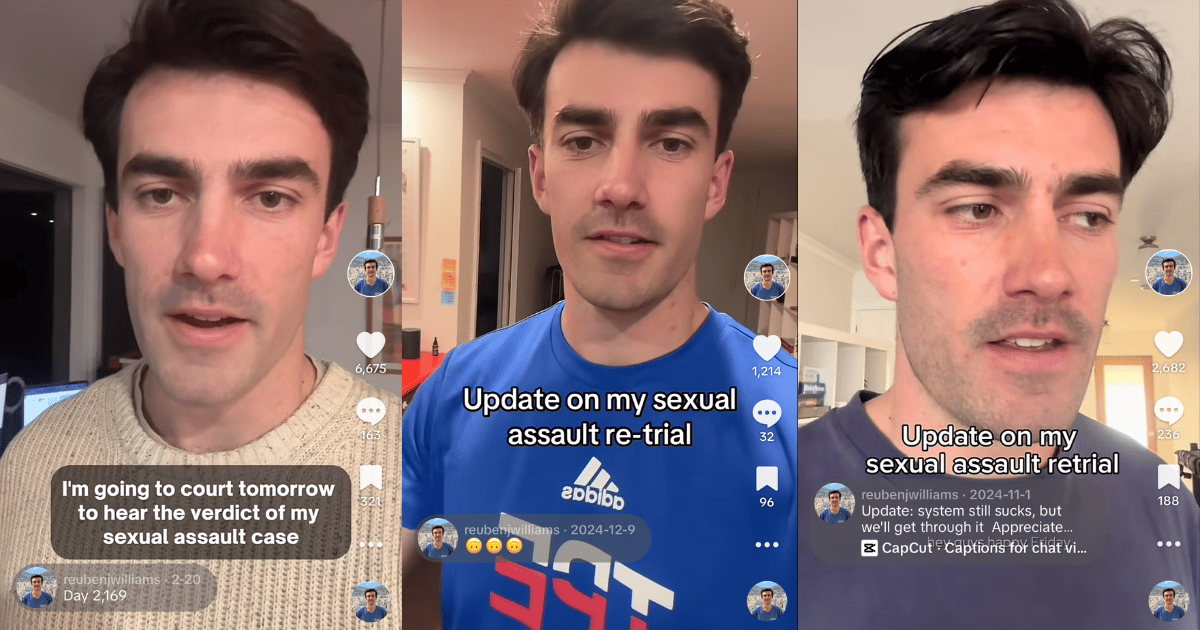
I want to live in a world where “Do what’s best for you” defaults to reporting sexual assault because it’s not only right, but safe. I don’t want to live in a world where “just forgetting about it” is the best option because it means perpetrators will forever get away with it.
Survivors are going to have to have uncomfortable conversations to make this a reality. But with every voice, change happens. The world becomes more educated. It gets easier to speak up.
Imagine a world where victims feel safe to speak because the barriers of ‘I won’t be believed’ and ‘the blame will be cast on me’ no longer exists.
I’m standing on the shoulders of giants when I say this.
“You HAVE to say something!” one particular rape victim implored to me.
So I did.
In the process of speaking up I received hundreds of messages from people saying:
“Your story helped me tell my partner for the first time”
“Your story helped me tell my friends”
“You gave me the strength to see a psychologist”
“You gave me the strength to go to the Police”
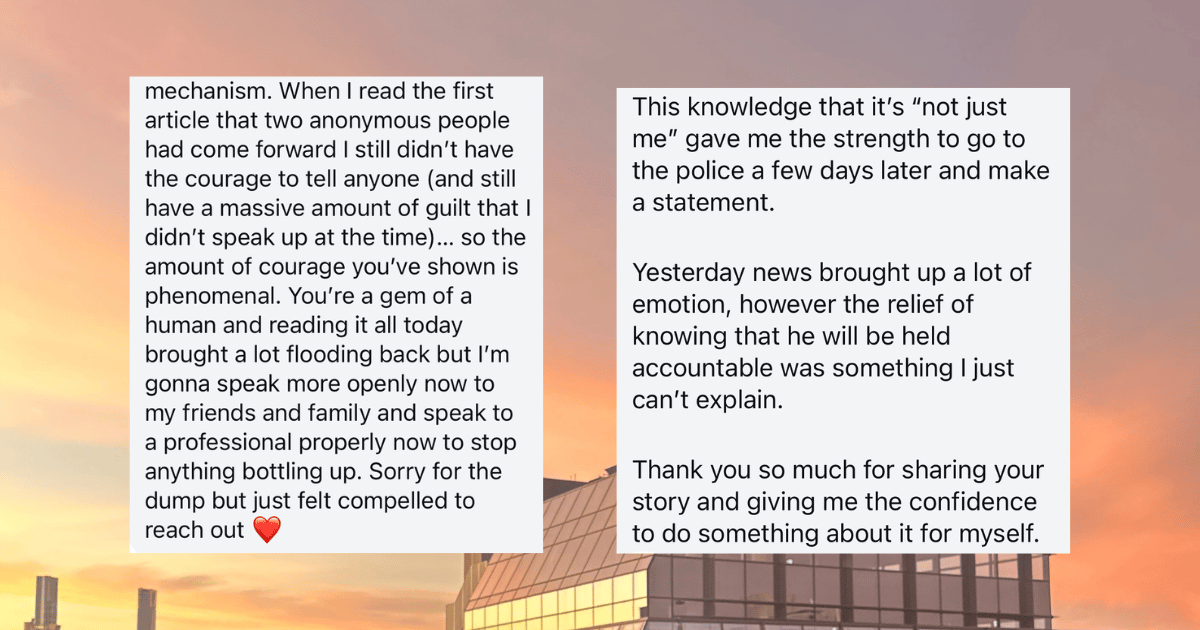
The impact of sharing this journey has been phenomenal. But I’m only one story out of millions that have the potential to inspire millions more. And so after six years of facing a system that failed me and coming out the other side better for it, I have the same request for survivors:
Come forward.
Speak up about what happened.
Even if that simply means telling a friend. Your story has the potential to save someone’s life. The only way barriers come down is if we, survivors, speak up. Nobody will ever care as much as us, therefore it is up to us. It might not be in our lifetime, but every person who speaks up makes it easier for the next person to come forward. If nothing changes, nothing changes. So if you’re on the fence about it, here are 3 reasons beyond your own healing to speak up:
1. You educate others
Every person who comes forward educates their community about what sexual violence looks like and how to respond to it. I have friends who didn’t know assault of my kind existed, nor what to say when I told them. Now they message me with language that makes me feel seen, and are better equipped to support the next person. By coming forward you make it easier for others to give and receive support.
2. You catch a predator
Every person who comes forward, stops a predator inflicting further harm. On Friday night I met the former friends of my perpetrator who had known what he was like for decades. I don’t know how far they travelled, but they made an effort to come and say they believe me, they stand with me, and thank me for what I had done. It was incredibly powerful. To them I’m grateful for helping me to understand the gravity of what was at stake. Your voice might just stop another crime.
3. You give hope to survivors
When you share your story, it inspires hope. Every person who comes forward, makes it easier for the next person to come forward because they feel less alone. I received a DM that says “I lost my fiancé to suicide after his mental trauma became too much, which was a result of sexual assault he experienced before I met him. I wish he had seen your case so he didn’t feel so alone.” My case might have been too late to save him, but according to my inbox it has helped hundreds of others. By coming forward, you give hope to those crippled by the trauma who find it hard to see life is worth living.
To the people that are yet to come forward, your reasons for staying silent are valid. But it’s also not too late. Your voice is so welcome. Maybe it’s been years and people will question your story. And maybe you don't think it’s worth ruining the other person’s life over. It’s all valid. But every time we let people off, we miss an opportunity to help the literally millions of people around the world suffering in silence. So yes, I understand that it’s tough to speak up. But it’s also fucking tough to live with staying quiet. Again, my DMs contain messages like “I constantly live with the guilt that I might have let it happen to someone else”. Perhaps you already feel that, to which I would ask, which version of tough do you want to live with?
When survivors take the easy option, it gets harder for others.
When survivors take the hard option, it gets easier for others.
I know it’s not easy, but I urge you to:
Shift from “do what’s best for you” to “do what’s best for the next person”
Recognise that speaking up isn’t just about your own healing, it’s about paving the way for future survivors.
Remember that your courage can spark a movement for change in a system that desperately needs reform.
Gisèle Pelicot put it best when she inspired others to think “Madame Pelicot did it, we can do it too”.
And should you take the path of speaking up, I hope that by the end of it (and I’m speaking from experience here) you’ll realise you are stronger than you ever knew.
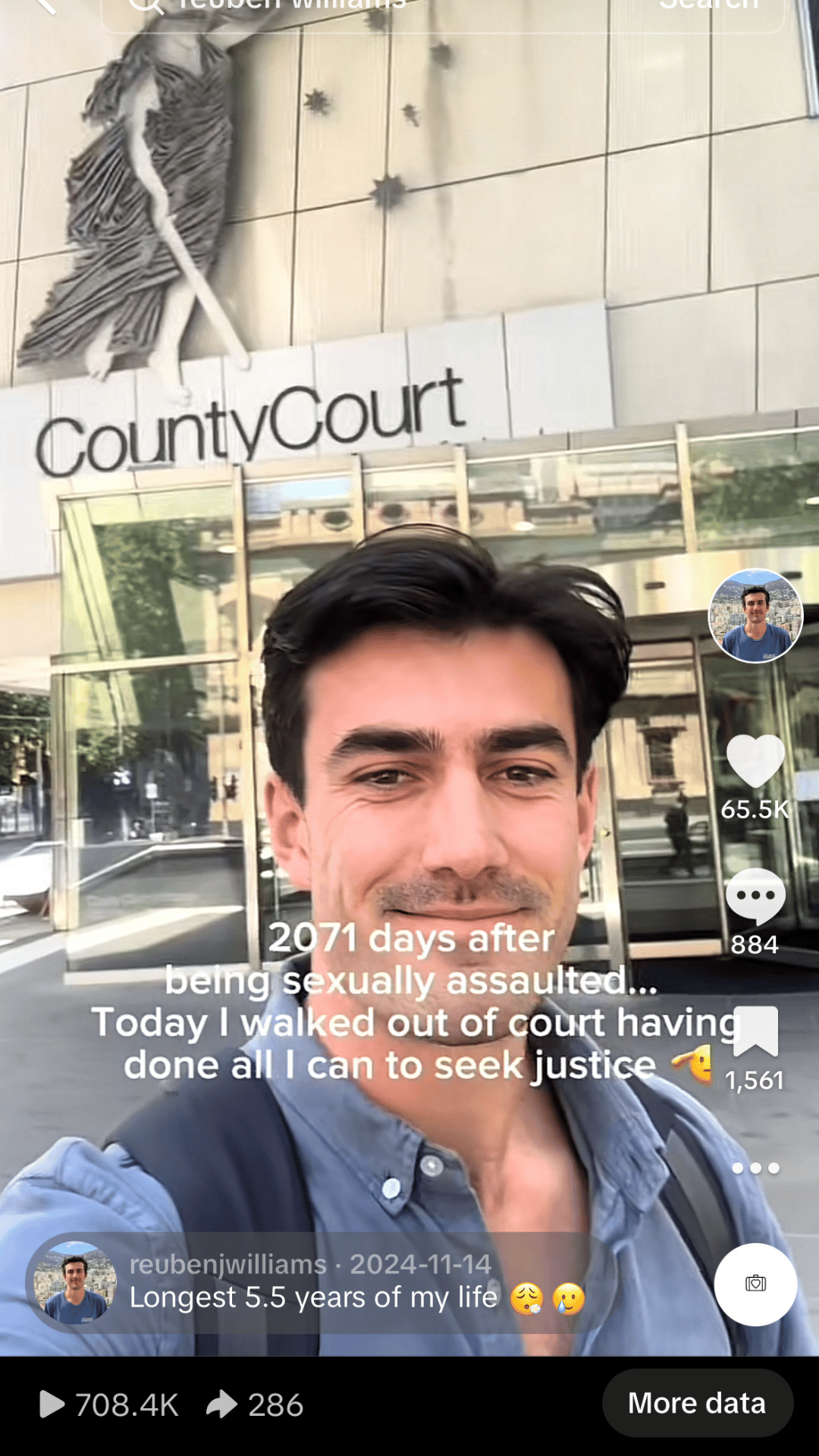
Over six years I became a different person. Taking the option to seek justice was a profoundly healing experience. Every step was empowering, from making a statement at the police station, to chuckling at the cross-examiner’s dumb questions, to looking my perpetrator directly in the eye from the witness stand. At every stage I cancelled plans and made sure I was in the country to address this challenge in person. After giving my evidence the second time, I debriefed with a friend who said “Reuben you sound invincible!” And I felt (and still feel) every bit invincible. With every step towards justice, the trauma got smaller and I got stronger.
If this journey (or any other survivor’s journey) has inspired you to speak up, I’d love to count it. I’ve created a tracker to understand how many voices the stories of survivors have inspired in hope it will encourage more to be part of this movement. If that’s you, I’d love you to share it here. And inside, if you feel comfortable to share your story (you can remain anonymous), I’d love to hear it and share it. By adding your story, you’ll help to inspire the next person to speak up. And if you’re not a survivor but you’re onboard with this mission, I’d love you to share this post with your circles.
So… after a few days to process it all, despite the bullshit result that is an absolute disgrace, I’m left with an overwhelming sense of purpose and pride, standing taller and more fired up than ever before. I’ll be speaking about my journey, the system’s failures, and the stories of others who speak up for a long time to come. If you’re considering coming forward, know that your courage has the power to inspire someone’s life. But I hope you find, that no matter how long the journey, you’ll unlock a strength you never knew existed.
Go get em’
Reuben
